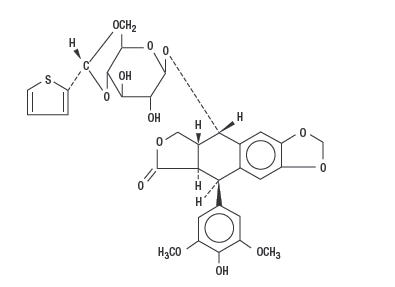Teniposide

Vumon is a prescription medication used with other chemotherapy drugs to treat acute lymphocytic leukemia (ALL) in children. It is used in when the you has not improved with other medications or when ALL has worsened. ALL a type of cancer of the white blood cells.
Teniposide is a phase-specific cytotoxic drug, acting in the late S or early G2 phase of the cell cycle, thus preventing cells from entering mitosis. Teniposide causes dose-dependent single- and double-stranded breaks in DNA and DNA-protein cross-links. The mechanism of action appears to be related to the inhibition of type II topoisomerase activity since teniposide does not intercalate into DNA or bind strongly to DNA. The cytotoxic effects of teniposide are related to the relative number of double-stranded DNA breaks produced in cells, which are a reflection of the stabilization of a topoisomerase II-DNA intermediate. Teniposide has a broad spectrum of in vivo antitumor activity against murine tumors, including hematologic malignancies and various solid tumors. Notably, teniposide is active against sublines of certain murine leukemias with acquired resistance to cisplatin, doxorubicin, amsacrine, daunorubicin, mitoxantrone, or vincristine.
Common side effects of Vumon include: low blood cell counts, sores and inflammation of the mouth, diarrhea, nausea, vomiting, infection, hair loss, bleeding, rash, and fever.
